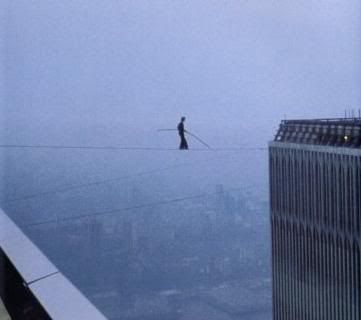 For the jaded viewer, James Marsh's Man on Wire should feel doubly refreshing. It's a film about the Twin Towers with nary a mention of their demise (even if the specter of 9/11 inevitably hovers over the proceedings) and it's a documentary that actually seems concerned with establishing a coherent visual program, thus setting the film apart from much of its aesthetically indifferent brethren. Then, too, Marsh has the advantage of a wildly charismatic subject - tightrope walker (or as one bewildered-admiring cop puts it, "tightrope dancer - because you can't really call what he does walking") Philippe Petit, whose firsthand testimony is wisely granted pride-of-place in the proceedings.
For the jaded viewer, James Marsh's Man on Wire should feel doubly refreshing. It's a film about the Twin Towers with nary a mention of their demise (even if the specter of 9/11 inevitably hovers over the proceedings) and it's a documentary that actually seems concerned with establishing a coherent visual program, thus setting the film apart from much of its aesthetically indifferent brethren. Then, too, Marsh has the advantage of a wildly charismatic subject - tightrope walker (or as one bewildered-admiring cop puts it, "tightrope dancer - because you can't really call what he does walking") Philippe Petit, whose firsthand testimony is wisely granted pride-of-place in the proceedings.Marsh relates the story of his subject - a Frenchman who felt compelled to conquer the Twin Towers since he first heard rumors of their construction (in his case, the conquering consisting of setting up a tightrope between the buildings and walking repeatedly back and forth) - through the usual assortment of talking heads, archival footage and reenactments. But invested in a certain commitment to visual variety, Marsh stages his reenactments in marked contrast to the archival segments. While the footage of Petit and his friends making their preparations is full of joyous optimism and shot on grainy color stock, the reenactments, which detail the nuts and bolts of the procedure - gaining access to the Towers, dodging security, setting up the wires - use crisp black-and-white photography to create a shadow-drenched atmosphere of perpetual danger and ramp up the narrative interest in a story whose conclusion is, after all, known to the viewer beforehand. When it's time for the actual performance atop the Towers, Marsh relies on neither reenactment nor archival video, instead intercutting interview segments with Petit's two closest colleagues, both moved to tears by their recollections, and a series of still photographs of the highwire act itself. Set to Michael Nyman's rousing score (repeated from a series of Peter Greenaway films, the subject of a small controversy stirred up by Godfrey Cheshire), the film's climax is nicely understated even as it threatens to bust open with raw feeling.
But for all Marsh's shrewd aesthetic calculations, there's little doubt that this show belongs to its central subject. Now in his late 50s, his blond-red shag faded into a dull yellow, Petit's palpable enthusiasm shows no sign of waning and as he situates his greatest accomplishment in the context of a lifelong yearning to "live on the edge" - the occasional arrogance of his speech offset by a sense of genuine conviction - his mission takes on the feeling of inevitability, even as the film is careful to show all the ways in which his Tower walk nearly resulted in failure at just about every turn. What we have here is a man creating his own mythology on camera - always an exercise that runs a high risk of viewer alienation - but given Petit's unshakable fervor, his great good humor and the sheer wonder and beauty of his enterprise, there's really little reason for the enchanted viewer to call Petit's account into any kind of question.

No comments:
Post a Comment